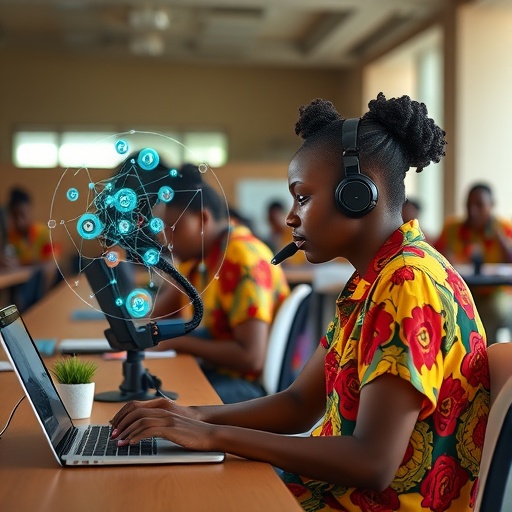In recent years, the emergence of generative artificial intelligence (AI) has transformed many sectors, including education. A new study by researchers in Ghana sheds light on how university students are leveraging these advanced tools to enhance their learning experiences. The exploration of generative AI tools among students is particularly relevant as these technologies continue to evolve and influence various aspects of academic life. The study reported in Discover Education provides crucial insights into this phenomenon and raises compelling questions about the implications of AI in educational settings.
The research focuses on generative AI tools, which include applications that can create original content, ranging from text to images, and even music. Students are increasingly turning to these platforms to assist with writing assignments, research projects, and various creative endeavors. With the growing accessibility of these tools, understanding how students utilize them is vital to address both the benefits and challenges associated with their use.
One key finding from the study is that students in Ghana are using generative AI mainly for enhancing their writing capabilities. Many students reported feeling overwhelmed by the demands of academic writing, and generative AI offers a potential solution. By providing suggestions, correcting grammar, and even generating essay outlines, these tools can alleviate the stresses associated with writing tasks. However, the researchers are keen to investigate how heavy reliance on these tools may affect students’ writing proficiency in the long run.
In addition to writing assistance, the study reveals that students use generative AI tools for brainstorming and idea generation. The creative potential of AI is appealing to students who often struggle to find inspiration for their projects. By inputting basic prompts, students can receive a wealth of ideas that can serve as a springboard for their work. This not only helps them get started on challenging topics but also enhances their overall learning experience by fostering a more exploratory approach to education.
Despite the advantages, the research also highlights concerns surrounding the ethical implications of using generative AI. Some students expressed anxiety about academic integrity and the fine line between utilizing AI-generated content and outright plagiarism. The study emphasizes the need for educators to provide clear guidelines on how to responsibly use these tools. By fostering a better understanding of authorship and originality, institutions can help students harness AI for learning while maintaining academic honesty.
The researchers also explored the demographic factors that influence the use of generative AI among students. Interestingly, the data revealed that students from diverse academic backgrounds exhibited different levels of engagement with these technologies. For instance, those studying computer science and related fields were more inclined to experiment with generative AI features, likely due to their familiarity with technology and digital tools. In contrast, students in the humanities showed more caution but expressed a desire for training on how to efficiently integrate AI into their academic workflow.
Furthermore, the study pinpointed a significant gap in awareness regarding the capabilities of generative AI tools among university students. Many participants admitted that they were unaware of the breadth of functionalities these tools offer. This lack of awareness suggests that there is an imminent need for educational institutions to incorporate AI literacy into their curriculum. By equipping students with the right knowledge and skills, universities can enable them to fully leverage the potential of generative AI tools.
The researchers conducted in-depth surveys and interviews with students from multiple universities, providing a comprehensive overview of their experiences and perspectives. This qualitative data was crucial in understanding the nuanced ways in which generative AI tools are embedded in students’ academic lives. By gathering firsthand accounts, the study offered rich insights that quantitative data alone may not reveal.
Overall, the findings of this study underscore a dynamic shift in how educational environments adapt to technological advancements. The increasing integration of generative AI in academic settings represents a significant opportunity to enhance student learning, but it also poses challenges that need to be addressed. As educators consider the future implications of AI, they must balance innovation with the importance of academic integrity and critical thinking skills.
Moreover, as the research points out, the global proliferation of generative AI tools should prompt universities to rethink their teaching methodologies. The traditional lecture-based model may need to evolve to accommodate more interactive and technology-driven approaches. Institutions that embrace this change could lead the way in shaping a new generation of learners who are adept at navigating the intersection of technology and education.
In conclusion, the study assessing the use of generative AI tools among university students in Ghana opens the door to a broader conversation about the role of technology in education. As generative AI becomes more commonplace, educators, students, and policymakers must engage in conversations about how to leverage these tools effectively while ensuring academic standards are upheld. The ongoing evolution of AI technology invites continuous exploration, and with it, the opportunity to redefine how knowledge is created and shared in academic settings.
As we move forward, it will be interesting to monitor how educational institutions adapt to these changes and what new paradigms emerge in the relationship between students and technology. The future of education in light of generative AI tools is still being written, and the contributions of the emerging generation of learners could reshape our understanding of teaching and learning in unprecedented ways.
Subject of Research: Use of generative artificial intelligence tools among University Students in Ghana.
Article Title: Exploring the use of generative artificial intelligence tools among University Students in Ghana.
Article References:
Kwakye, I.N., Kwakye, K.A.P., Adom-Fynn, D. et al. Exploring the use of generative artificial intelligence tools among University Students in Ghana.
Discov Educ 4, 432 (2025). https://doi.org/10.1007/s44217-025-00608-1
Image Credits: AI Generated
DOI: 10.1007/s44217-025-00608-1
Keywords: Generative AI, education, academic integrity, student learning, technology in education.




